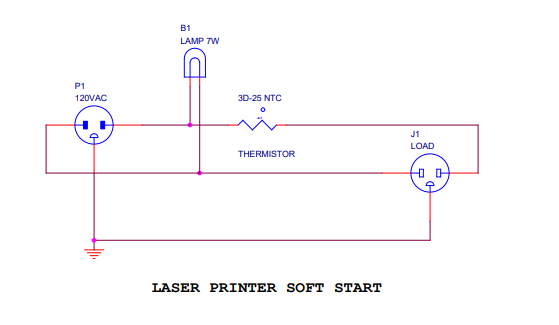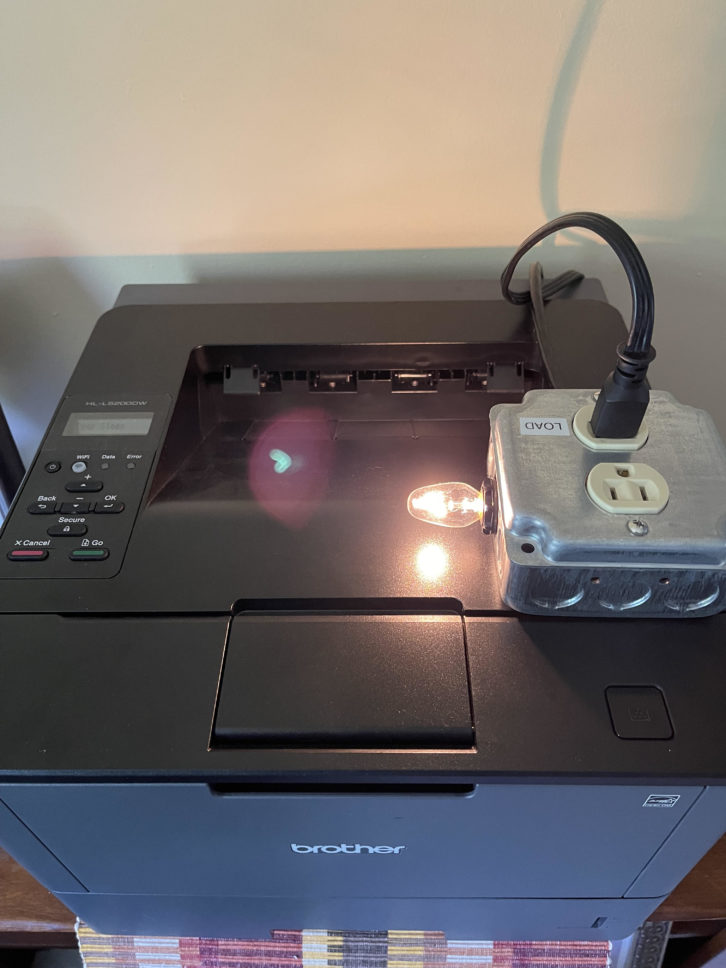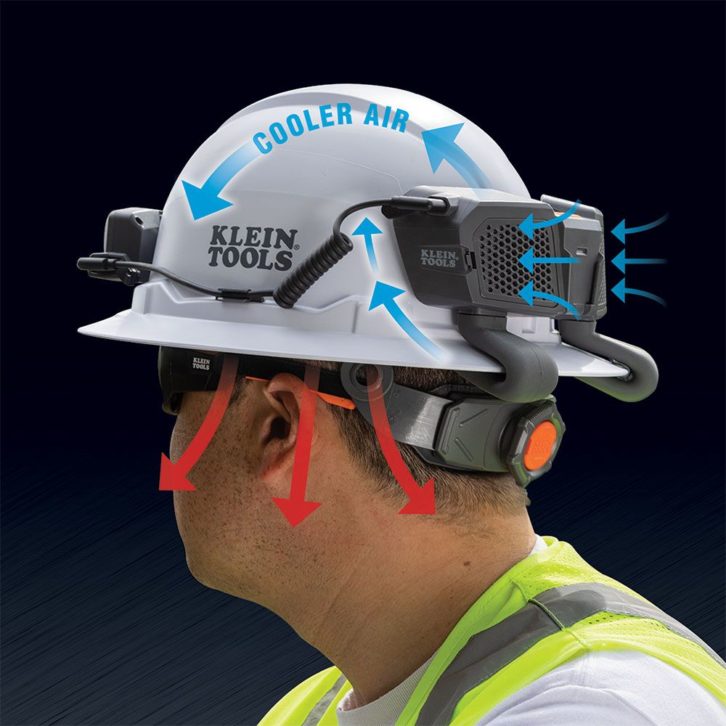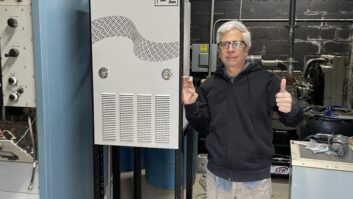Former Summit Director of Engineering Dennis Sloatman, now retired, encountered an annoying issue familiar to any of us who have home offices. Whenever he sent a job to his Brother laser printer, he had problems: monitors blanking, UPS units beeping and lights flickering.
Dennis found the cause. When the printer comes out of sleep mode, a fairly large current spike (some 11 amps) is generated.
His solution involved an NTC Thermistor #3D-25. This thermistor is rated for 9 Amps continuous.

“NTC” stands for Negative Temperature Coefficient. So the resistance drops as temperature (caused by the current) goes up.
The thermistor chosen has a quiescent resistance at 25 degrees C of 5 Ohms, so, when the 11-amp surge rises, it drops 55 volts to the laser printer, but only for a millisecond or so, and gradually allows the normal 120VAC through (or nearly so).
He fixed the issue as depicted in the accompanying schematic. Dennis envisions many applications for a circuit of this type; and of course, there are a range of thermistors available for various applications.
Dennis built his circuit in a quad electrical box with a duplex outlet and extension cable. Let me and your fellow Workbench readers know if you come up with other applications for this circuit.

Don’t get screwed again
From Malaysia, Workbench regular Paul Sagi sends a link to a professional-grade kit for extracting broken bolt and stripped screws, and it costs under $30.
The Alden 8440P Grabit Pro Broken Bolt & Damaged Screw Extractor 4 Piece Kit is made in the USA of high-quality tool steel. The extractors are designed to fit into a variable reversible drill but can also be used with a 1/4-inch hex screwdriver.
Bolts and screws as small as No. 10 can be removed easily. The bits are designed to work with not only slotted and Phillips heads, but also Hex, Torx, Tri-Wing, Pozidriv, Fearson and most tamper-resistant screws.
The standard Grabit has been advertised on television for years, but the Pro model is tempered twice to provide multiple uses per tool. The 8440P has four bits; you can also buy packages of one to three bits.
Testing, testing
In a previous column I lamented the demise of the Fox and Hound audio signal tracer.
Bob Clinton of technical consulting firm Cavell Mertz & Associates tells us that Fluke manufactures at least three versions of a similar signal tracer.
If all you need is tones, the Fluke Networks Pro3000 Tone Generator will fit the bill. If you need a generator and signal sniffer, the Pro3000 line also includes a kit that includes the tone generator and a filtered receiving probe. See various options by searching Pro3000 here. And for more advanced signal tracing, look at Fluke’s MT-8200-60.

Klein Tools has an advanced circuit tracer that can be used on both energized and non-energized circuits. Search ET450 in the search block here. There are YouTube videos showing the ET450 in action — tracing wiring that’s underground and even behind walls in conduit.
Bob adds that if you are troubleshooting AES signals, check out the Whirlwind Qbox-AES. This test instrument includes a microphone, a speaker, a test-tone generator and outputs for standard headphones.
Finally, NTi has a Minirator, model MR-PRO, that provides a range of audio test signals.
Thanks to Bob for these choices. Cavell Mertz & Associates maintains the free and useful website FCCInfo.com, which provides searchable information on AM, FM, TV and even Auxiliary Services like RPU and STL channels. Radio World uses it all the time. Find it at www.fccinfo.com.
[Read Another Workbench by John Bisset]
Cool over the collar

If you wear a hard hat or safety helmet regularly, you may want to consider Klein Tools’ Cooling Fan for Hard Hats and Safety Helmets.
I stumbled across this as I was researching Bob Clinton’s Klein signal tracer suggestion. Model 60155 is a dual-fan design for efficient airflow on the head, neck or face, providing up to six hours of continuous runtime. It uses a modular rechargeable battery. The easy mount design permits either front or back mounting. Find out more here.
A tale with a twist
Before we wrap, I have to tell you my Klein story.
Many engineers own a pair of 9-inch Klein Journeyman pliers. They are big and beefy — as the Klein website describes them, they have “a precision-hardened plier head, for on-the-job toughness.” They’re a must-have for electrical work.
Well, a former business associate told me about the time a co-worker was accosted. But the victim used that “precision-hardened plier head” to grab a bit of the accoster’s abdominal flesh, pinching and twisting it and bringing the troublemaker to his knees. Talk about “concealed-carry.”
From then on, my associate keeps his own “Kleins” in his back pocket more often.
Tips please! Workbench submissions are encouraged and qualify for SBE recertification credit. Email [email protected].












